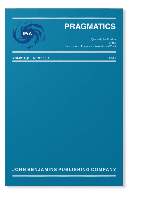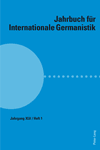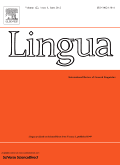
Fluminensia
Scope & Guideline
Illuminating the Intersection of Linguistics and Literature
Introduction
Aims and Scopes
- Linguistic Analysis and Collocation Studies:
The journal focuses on the study of collocations and their implications in various contexts, including legal, literary, and everyday language. It examines how collocations shape meaning and contribute to effective communication. - Cognitive and Pragmatic Approaches to Language:
Fluminensia emphasizes cognitive and pragmatic aspects of language, investigating how language reflects thought processes and social interactions. This includes studies on metaphors, idioms, and their roles in discourse. - Cultural and Literary Criticism:
The journal publishes critical analyses of literature and cultural texts, exploring themes of identity, memory, and historical narratives within Croatian and broader Southeastern European contexts. - Corpus Linguistics and Digital Humanities:
There is a growing interest in corpus-based studies and the application of digital humanities methodologies to linguistic research, allowing for empirical investigations of language use and variation. - Interdisciplinary Research:
Fluminensia encourages interdisciplinary approaches, integrating insights from linguistics, literature, cultural studies, and history to provide a comprehensive understanding of language and its societal roles.
Trending and Emerging
- Metaphor and Emotion in Language:
There is a growing focus on the role of metaphor in conveying emotional content within discourse, particularly in political and social contexts. This trend highlights the importance of figurative language in shaping public perception and emotional responses. - Corpus-Based Linguistic Research:
An increasing number of studies utilize corpus linguistics to analyze language patterns and usage, reflecting a methodological shift towards data-driven research in understanding collocations and language phenomena. - Pragmatics and Speech Acts:
Research exploring pragmatics, specifically speech acts such as greetings and politeness strategies, is gaining traction. This reflects an interest in the social functions of language and its implications for communication. - Digital and Media Linguistics:
Emerging studies on digital communication, including social media language and its impact on public discourse, are becoming more prevalent, showcasing the relevance of linguistic research in the context of digital humanities. - Interdisciplinary Studies on Identity and Culture:
There is a notable trend towards interdisciplinary studies that examine the intersections of language, identity, and culture, particularly in the context of migration and globalization, indicating a broader societal engagement.
Declining or Waning
- Traditional Linguistic Structures:
Studies focusing solely on traditional linguistic structures and grammar without contextual application have become less frequent, as researchers increasingly seek to connect linguistic analysis with cultural and social phenomena. - Historical Linguistics:
There appears to be a waning interest in purely historical linguistic studies, as contemporary issues and modern applications of language take precedence in recent publications. - Narrowly Defined Literary Genres:
Research concentrated on narrowly defined literary genres without consideration of broader cultural implications is appearing less frequently, suggesting a shift towards more integrative analyses that encompass diverse literary forms. - Static Language Teaching Methodologies:
Papers focusing exclusively on static methodologies for language teaching, without incorporating contemporary pedagogical strategies or technology, are less common, indicating a move towards more dynamic and interactive approaches. - Isolation of Croatian Literature:
There is a noticeable decline in studies that isolate Croatian literature from global contexts, as scholars increasingly recognize the importance of comparative literature and cross-cultural influences.
Similar Journals

ENGLISH STUDIES
Where Literature Meets Linguistics: A Hub of InnovationENGLISH STUDIES, published by Routledge Journals, Taylor & Francis Ltd, is a premier journal dedicated to exploring the rich tapestry of literature and linguistics. With a historical backdrop stretching from 1919 to 2024, the journal serves as a vital platform for scholars and practitioners engaged in advanced research and critical analysis. Its distinguished status is reflected in its impressive impact factor and category quartiles, ranking Q1 in Literature and Literary Theory and Q2 in Linguistics and Language for 2023, evidencing its influence and relevance in these fields. The journal's commitment to scholarly excellence is underscored by its high standings in Scopus Ranks, where it holds the #272 position in Literature and Literary Theory. Though it does not offer Open Access, the journal nevertheless ensures that its contributions shape contemporary understandings and discussions. As a vital resource for students, professionals, and researchers alike, ENGLISH STUDIES continues to push the boundaries of inquiry, dialogue, and innovation in the ever-evolving landscape of English literature and linguistics.

Iberica
Democratizing access to cutting-edge linguistic research.Iberica, an esteemed journal published by AELFE, serves as a vital platform for scholarly discourse in the fields of linguistics and language studies. With its inception as an Open Access publication in 1999, Iberica has democratized access to high-quality research, fostering an environment of collaboration and innovation among researchers and professionals alike. Based in Spain at UNIV JAUME I, the journal has witnessed a remarkable ascent in the 2023 category quartiles, achieving a Q1 ranking in Linguistics and Language. Furthermore, its impressive Scopus rankings place it in the top 25% within both the Arts and Humanities and Social Sciences disciplines. Covering a diverse range of topics from theoretical linguistics to applied language studies, Iberica offers a compelling opportunity for academics seeking to contribute to and engage with contemporary issues in the linguistic landscape. As it converges in its publishing years from 2008 to 2024, it continues to set the standard for excellence within its field, making it an essential resource for students, researchers, and language professionals.

Pragmatics
Exploring the nuances of meaning and communication.Pragmatics is a premier international journal dedicated to the exploration and development of the field of pragmatics, published by John Benjamins Publishing Co. This esteemed journal, with an ISSN of 1018-2101 and E-ISSN 2406-4238, offers a vital platform for interdisciplinary research in linguistics, philosophy, and social sciences, making significant contributions to scholarly discourse since its convergence in 2005. Recognized for its high-impact research, Pragmatics boasts a prestigious Q1 ranking in both Linguistics and Language and Philosophy as of 2023, with impressive Scopus rankings that place it in the top percentiles of its categories. The journal aims to enhance understanding of communication in diverse contexts and encourages submissions that reflect innovative theoretical perspectives and empirical findings. Although not an open-access journal, it is essential for researchers, professionals, and students seeking to stay at the forefront of pragmatic studies and related disciplines. With its base in Belgium and an address in Amsterdam, Pragmatics continues to influence global conversations in the humanities and social sciences.

JAHRBUCH FUR INTERNATIONALE GERMANISTIK
Fostering Critical Discourse in German Language and CultureJAHRBUCH FUR INTERNATIONALE GERMANISTIK is a prominent academic journal published by VERLAG PETER LANG AG, dedicated to advancing research in the fields of German studies, literature, and linguistics. With its ISSN 0449-5233 and E-ISSN 2235-1280, this journal provides a platform for scholarly discourse, critical analysis, and innovative studies related to German language and literary theory. Although its coverage in Scopus was discontinued in 2014, the journal continues to be influential within the academic community, evidenced by its rankings in the Arts and Humanities and Social Sciences categories. Specifically, it holds a rank of #397 in Literature and Literary Theory and #477 in Language and Linguistics, reflecting a solid presence among peers. Researchers and students alike can benefit from its insightful articles that delve into various dimensions of Germanistik, thereby fostering a greater understanding of language and cultural contexts. For those interested in contributing to this field of study, JAHRBUCH FUR INTERNATIONALE GERMANISTIK serves as an essential resource for high-quality scholarly content.

Journal of Greek Linguistics
Championing the Study of Greek Language and Its ImpactThe Journal of Greek Linguistics, published by BRILL, is a premier platform dedicated to advancing the study of Greek language and its historical and contemporary implications within the broader field of linguistics. With an impact factor recognized in the linguistics community, this journal significantly contributes to the academic discourse surrounding Greek linguistics and its relevance in cultural and social studies. First made open access in 2016, it is now accessible to a global audience, facilitating a collaborative environment for researchers, scholars, professionals, and students alike. The journal is proudly positioned in the Q2 quartile for linguistics and language, reflecting its esteemed standing in the academic community, and it ranks within the top 30% in both the Arts and Humanities and Social Sciences categories according to Scopus. With a focus on the intersection of language, culture, and society, the journal invites contributions that offer new insights and promote interdisciplinary research. The Journal of Greek Linguistics continues to be an essential resource for those engaged in the rich and evolving conversation about the Greek language.

Anales de Filologia Francesa
Connecting Researchers Through Open Access KnowledgeAnales de Filologia Francesa is a prominent academic journal dedicated to the fields of French philology, linguistics, and literature, published by UNIV MURCIA. Since its transition to open access in 1985, this journal has enabled a wider dissemination of knowledge, fostering scholarly communication among researchers, professionals, and students alike. Based in Spain, Anales de Filologia Francesa plays a pivotal role in addressing current issues and advancements within its scope, underscored by its notable rankings within the Scopus database, where it places in the second and third quartiles across various disciplines related to literature and linguistics. With a commitment to publishing high-quality research, this journal is essential for those looking to engage with cutting-edge studies in French literary theory, language use, and educational practice.

Revista da Anpoll
Advancing knowledge in Letters and Linguistics.Revista da Anpoll is a prestigious academic journal dedicated to the fields of Letters and Linguistics, published by the ASSOC NAC POS-GRADUACAO PESQUISA LETRAS & LINGUISTICA in Brasilia, Brazil. Since its inception in 1994, this Open Access journal has aimed to foster scholarly communication and lead discourse in the linguistic and literary disciplines, allowing researchers and practitioners free access to cutting-edge research and findings. Although it does not currently have an H-index, the journal continues to attract high-quality submissions from experts in its field, contributing to the global academic community. By offering a platform for innovative studies and discussions, Revista da Anpoll plays a critical role in advancing knowledge and practice within linguistics and literary studies, making it an invaluable resource for academics, professionals, and students alike.

Naslede
Empowering researchers through peer-reviewed excellence.Naslede is a distinguished scholarly journal published by the University of Kragujevac, Faculty of Philology and Arts. With an ISSN and E-ISSN of 1820-1768, it serves as a vital platform for the dissemination of research in the fields of philology, arts, and cultural studies. The journal aspires to foster academic dialogue and scholarly exchange, providing researchers, professionals, and students with access to high-quality, peer-reviewed articles that explore the intersections of language, literature, and artistic expression. While it currently does not offer open access options, the significance of Naslede within its field cannot be overstated, as it contributes to the broader academic community by highlighting innovative research and emerging trends in the humanities. Located in Kragujevac, Serbia, the journal is positioned to bridge local and international scholarship, making it an essential resource for those dedicated to advancing knowledge in these disciplines.

Jordan Journal of Modern Languages & Literature
Advancing Scholarship in Modern Language StudiesJordan Journal of Modern Languages & Literature is a prestigious academic journal published by Yarmouk University, Deanship of Research & Graduate Studies. This journal serves as a vital platform for scholars and researchers in the fields of linguistics and literature, offering a well-rounded examination of modern languages and literary theory. With an impressive Q2 ranking in Linguistics and Language and a Q1 distinction in Literature and Literary Theory as of 2023, it consistently features high-quality research that contributes to the advancement of knowledge in these domains. The Scopus rankings further reflect its academic rigor, placing it in the 79th percentile for Literature and Literary Theory and maintaining significant influence in related fields, making it an essential resource for researchers, professionals, and students alike. Although it does not operate under an open-access model, the journal's commitment to publishing groundbreaking studies can significantly aid in the understanding and progression of modern linguistic and literary practices. The Jordan Journal of Modern Languages & Literature continues to be an influential voice in fostering scholarly dialogue and advancing research in the humanities.

LINGUA
Advancing the frontiers of linguistic research.LINGUA is a premier academic journal dedicated to the field of linguistics, published by ELSEVIER and based in the Netherlands. With an ISSN of 0024-3841 and an E-ISSN of 1872-6135, this esteemed journal has garnered a reputation for excellence, evidenced by its position in the top Q1 quartile in Linguistics and Language as of 2023. LINGUA serves as a vital platform for scholars, researchers, and students, showcasing innovative research and critical discussions across various linguistic subfields. The journal has demonstrated impressive Scopus rankings—151 out of 1088 for Language and Linguistics, and 176 out of 1167 in Social Sciences—placing it in the 86th and 84th percentiles, respectively. By providing a forum for the dissemination of advanced linguistic theories and their applications, LINGUA continues to significantly contribute to the academic community, making it an essential resource for anyone engaged in the study of language.